CIRJE Conferences 2000
- "Statistical Aspects of Insurance and Finance"Conference(CIRJE) March 23, 2001
- Global Environment and Energy Industries" Editor Conference (CIRJE) January 27-28, 2001
- Trio 2000 Conference (NBER-CEPR-TCER/CIRJE) December 15-16, 2000
- Shadow Financial Regulatory Committe Conference (Ernst & Young/CIRJE) October 17, 2000
- The SFRC Workshop (CIRJE) October 15-16, 2000
- Japan Project Meeting (NBER/CIRJE/EIJS/CEPR) September 22-23, 2000
- The Second CIRJE・TCER MacroConference (TCER/CIRJE) September 21, 2000
- The Financial Evolution of Japan and the United States (CIRJE) July 28, 2000
- CIRJE-TCER Conference on Mechanism Design for the Global Environment Protection (TCER/CIRJE) July 22-23, 2000
Statistical Aspects of Insurance and Finance
(CIRJE Conference)
- Organizer: Naoto Kunitomo
- March 23, 2001
- Meeting Room No.1, Faculty of Economics, University of Tokyo
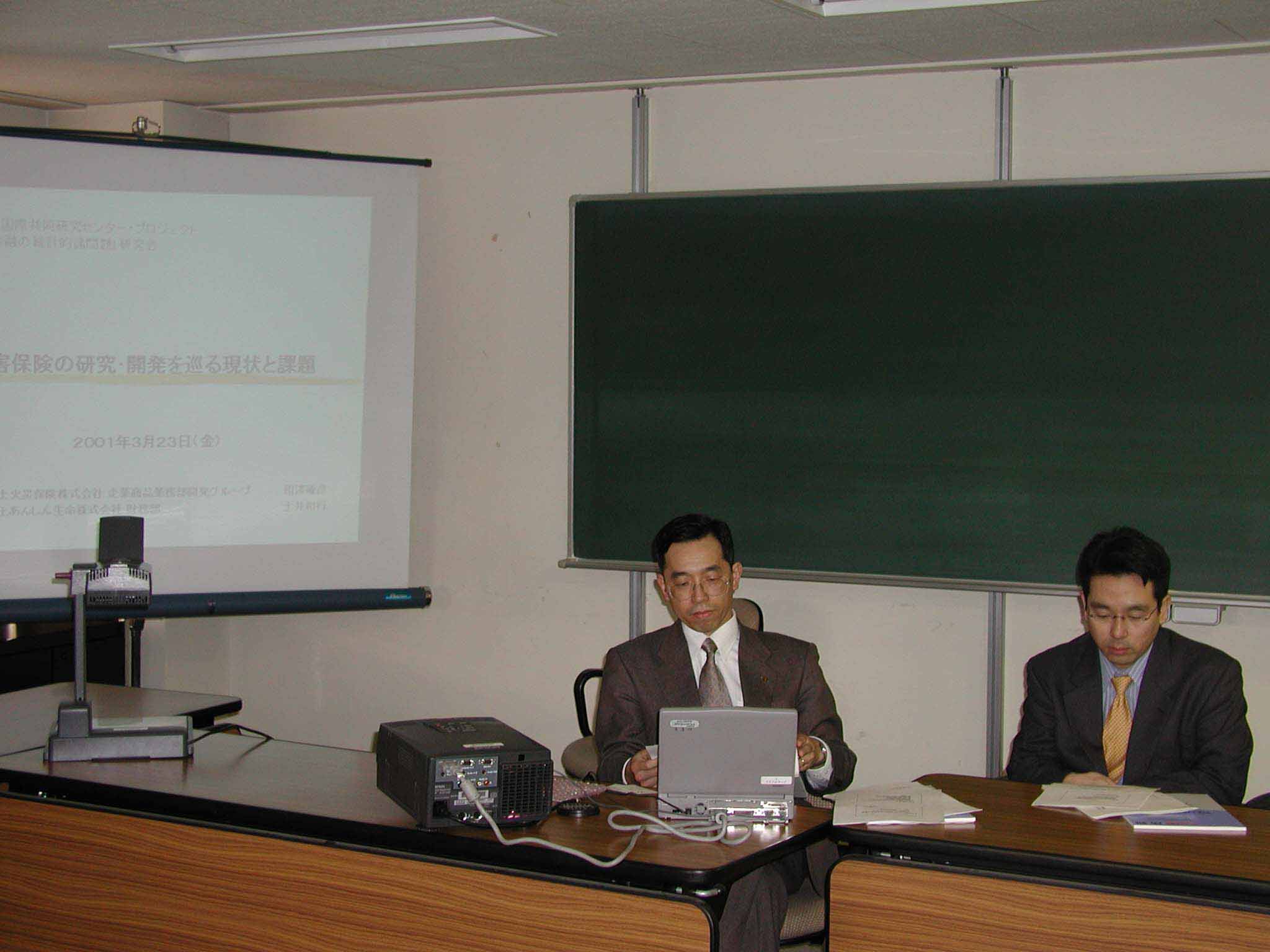
SUMMARY
The first conference on "Statistical Problems in Insurance and Finance" by the project was held at the University of
Tokyo on March 23, 2001. It was mainly intented to understand the real issues and problems in the research and
development activities in Insurance Industries, which are closely related to the actuarial sciences and statistics, at
the first conference. For this purpose Toshihiko Aizawa and Kazuyuki Doi (Tokio Marine and Fire Co.) gave a talk on the
current issues in the non-life insurance industry, and Syuji Tanaka (NLI Research Institute) gave a talk on the current
issues in the life insurance industry. Then Naoto Kunitomo (the project leader) gave a short talk on the reserach
directions in the related areas. Rather intensive discussions have been risen including some controversial new
directions in the recent financial markets including the earchquake insurances and the weather derivatives. Some
fundamental questions have been raised around the issues of risk diversifications in these cases and the distinction
between the insurance contracts and the derivatives. The next conference will be more stressed on the related problems
and researches in stochastic analysis, statistics, and finance.
PROGRAM
Chair: Yoshihiro Yajima, Faculty of Economics, University of Tokyo
15:00-15:05 Naoto Kunitomo, Faculty of Economics, University of Tokyo
Remarks about the project
15:10-16:10 Toshihiko Aizawa, Tokio Marine and Fire Insurance
"Recent Problems in Non-life Insurance"
16:20-17:20 Shuji Tanaka, Nissei, NLI Research Institute
Recent Problems in Life Insurance
17:30-17:45 Naoto Kunitomo, Faculty of Economics, University of Tokyo
"On Insurance Risk Theory"
Global Environment and Energy Industries" Editor Conference
(CIRJE Conference)
- Organizer: Kazuharu Kiyono
- January 27-28, 2001
- Hotel Sofitel Tokyo
Summary
In this editorial conference, the editors reviewed all the papers submit-
ted to compile as a conference volume. The requests for revsions were
processed so as to make the conference volume be one of the best starting
poits for graduate and under-graduate students interested in environment
economics as well as the global warming problem.
Participants
Keijiro Otsuka(Faculty of Economics, Tokyo Metropolitan University)
Naohisa Hirakata (Graduate School of Business and Commerce, Keio University)
Kazushige Shimpo(Faculty of Business and Commerce, Keio University)
Masahiro Okuno-Fujiwara(Faculty of Economics, University of Tokyo)
Masahiro Kuroda(Faculty of Business and Commerce, Keio University)
Kazuharu Kiyono(School of Political Science and Economics, Waseda University)
Takuya Kuroda(University of Tokyo Press)
Trio 2000 Conference
(NBER-CEPR-TCER/CIRJE)
- Organizers:
Yoshio Higuchi (Keio University)
Takeo Hoshi (UC, San Diego)
Sadao Nagaoka (Hitotsubashi University)
Shin-ichi Fukuda (University of Tokyo) - Theme: Unemployment
- December 15-16, 2000
- International House of Japan, Tokyo
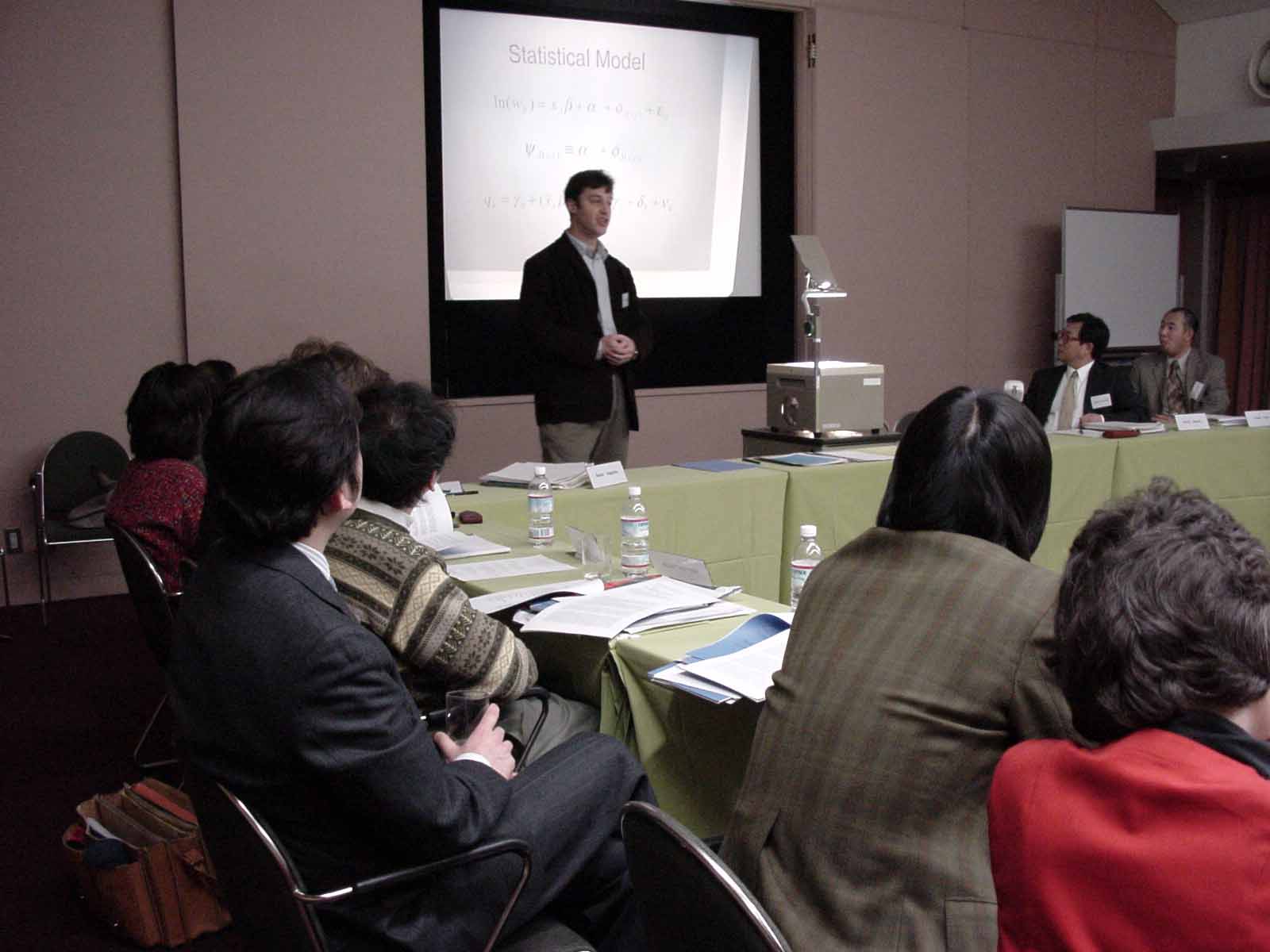
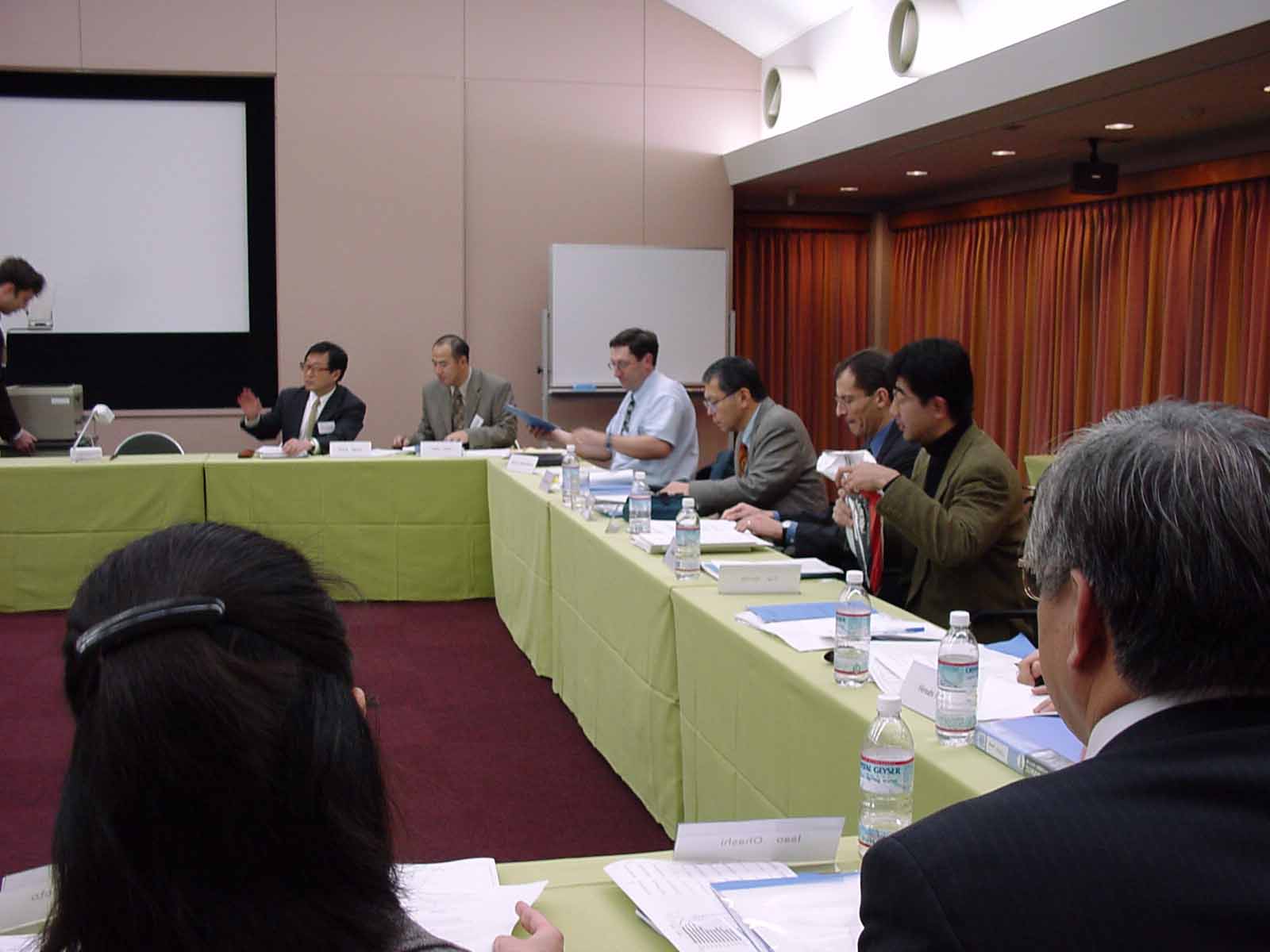
The unemployment rate in Japan is now higher than the U.S. unemployment rate. This would have been unthinkable just five years ago. Many Europe countries have experienced double digit unemployment for over a decade. Rising unemployment in Japan, declining unemployment in the U.S., and persistently high unemployment in Europe raise important questions for both economists and policymakers. Are the recent movements in unemployment rates in Japan a cyclical phenomenon or a structural shift that will produce persistently high unemployment like in Europe? The Trio conference was organized to address these sets of issues. The topics included in the conference follow below.
(1) The changing lifetime employment in Japan.
(2) Is there a "new economy" in the United States?
(3) Recent changes in labor flows in U.S., Japan, and Europe --- Are there any interesting changes?
(4) Credit markets and (self) employment.
(5) Short-run labor surplus and long-run labor shortage in Japan, implications for immigration labor, etc.
<List of Participants>
Kiyohiko G. Nishimura (University of Tokyo), Shin-ichi Fukuda (University of Tokyo), Yoshio Higuchi (Keio University), Takeo Hoshi (UC, San Diego), Sadao Nagaoka (Hitotsubashi University), David G. Blanchflower (Dartmouth College/ NBER), Yuji Genda (Gakushuin University), Francis Kramarz (CEPR), Eugene Kandel (Hebrew University) , Takao Kato (Colgate University), Masanori Hashimoto (Ohio State University), Masahiro Abe (Dokkyo University) , Andrew Oswald (University of Warwick)
PROGRAM
FRIDAY, DECEMBER 15:
9:30 AM DAVID G. BLANCHFLOWER, Dartmouth College and NBER
Unemployment, Well-Being and Wage Curves in Eastern Europe
Discussants: YOSHIO HIGUCHI, Keio University and TCER
SADAO NAGAOKA, Hitotsubashi University and TCER
11:00 AM YUJI GENDA, Gakushuin University and TCER
MASAKO KUROSAWA, Meiji Gakuin University
Transition From School to Work in Japan
Discussants: KURAMITSU MURAMATSU, Nanzan University
YUKINOBU KITAMURA, Hitotsubashi University and TCER
12:00 PM Lunch
1:30 PM FRANCIS KRAMARZ, INSEE-CREST and CEPR
(Joint with JOHN ABOWD, DAVID MARGOLIS, and KENNETH TROSKE)
The Relative Importance of Employer and Employee Effects on
Compensation: A Comparison of France and the United States
Discussants: ISAO OHASHI, Hitotsubashi University and TCER
YOSHIHIRO KANEKO, National Institute of Population and Social Security Research
3:00 PM EUGENE KANDEL, Hebrew University
(Joint with NEIL D. PEARSON)
Flexibility vs. Commitment in Personnel Management
Discussants: HIDESHI ITOH, Hitotsubashi University and TCER
TAKEO HOSHI, University of California, San Diego and TCER
4:00 PM TAKAO KATO, Colgate University
The End of "Lifetime Employment" in Japan?:
Evidence from National Surveys and Field Research
Discussants: MASANORI HASHIMOTO, Ohio State University and NBER
JENNIFER CORBETT, Oxford University and CEPR
5:00 PM Adjourn
SATURDAY, DECEMBER 16:
9:30 AM JAN VAN OURS, Tilberg University and CEPR
Unemployment and Labor Market Institutions: An Empirical Analysis
Discussants: SHIN'ICHI FUKUDA, University of Tokyo and TCER
YUJI GENDA, Gakushuin University and TCER
11:00 AM MASAHIRO ABE, Dokkyo University
SOUICHI OHTA, Nagoya University
Fluctuations in Unemployment and Industry Attributes
Discussants: HIROSHI FUJIKI, Bank of Japan and TCER
MASANORI HASHIMOTO, Ohio State University and NBER
12:00 PM Lunch
1:00 PM Adjourn
Shadow Financial Regulatory Committe Conference
Future of Financial Regulation--Global Financial Regulatory Reform and Implications for Japan-- (Ernst&Young/CIRJE)
- Organizers: Akiyoshi Horiuchi and Mitsuihiro Fukao
- October 17, 2000
- Tokyo Kaikan, Japan
On October 17, CIRJE held a panel discussion inviting journalists and policy makers responsible for financial supervision to discuss current problems in the Japanese financial system. The panel was able to stimulate active discussions between academic scholars and policy makers on the features of a desirable supervision policy in Japan. At the end of the conference, the SFRCs announced a joint proposal for reforming Japan's financial supervisory policy by emphasizing the importance of market discipline within the framework of a financial safety net.
PROGRAM
| Time | Title | Presenter |
|---|---|---|
| 9:00-9:25 | Registration | |
| 9:25-9:30 | Remarks by the Chair | Yoshio Kohra (Century Ota Showa&Co.) |
| 9:30-10:15 | Presentation 1 "Basel Committee's new capital adequacy framework: Making it effective with market discipline" |
Harald Benink (Erasums University Rotterdam) Clas Wihlborg (Gothenburg University) |
| 10:15-10:35 | Coffee Break | |
| 10:35-12:00 | Panel discussion 1 "US financial supervision" Moderator: John Lyngaas (Ernst &Young) | |
| "Safety-net reform in the United States: What has been done and what remains to be done" | George G. Kaufman (Loyola University Chicago) Peter J. Wallison (American Enterprise Institute) |
|
| "Does bank regulation retard or contribute to systemic risk?" | George G. Kaufman (Loyola University Chicago) Kenneth E. Scott (Stanford University) |
|
| "Regulatory implementation of financial modernization legislation―progress or regress" | Don Vangel (Ernst & Young) | |
| 12:00-13:00 | Lunch (Silver Room, Orion Room) | |
| 13:00-13:30 | Keynote speech "A plan for the Japanese economy in the 21st century―market, government, and democratic institutions." | Naoki Tanaka (The 21st Century Public Policy Institute) |
| 13:30-14:15 | Presentation 2 "Regulating and supervising operational risk for banks" | Hans Geiger (University of Zurich) |
| 14:15-14:35 | Coffee break | |
| 14:35-14:55 | Presentation 3 "Insolvency probability of a financial institution and the optimum premium for deposit insurance" | Mitsuhiro Fukao (Keio University) |
| 14:55-15:15 | Presentation 4 "Developments of Japan's financial safety net" | Takeo Hoshi (University of California, San Diego) |
| 15:15-17:25 | Panel discussion 2 "Japan's financial supervision" Moderator: Akiyoshi Horiuchi (University of Tokyo) | Panelists: Hide'ichiro Hamanaka (Financial Services Agency) Yoshihiro Fujii (Japan Economic Journal) Yoshio Okubo (Financial Services Agency) Gillian Tett (Financial Times Tokyo) |
| 17:25-17:30 | Closing remark by the Chair | Yoshio Kohra (Century Ota Showa & Co.) |
| 18:00- | Dinner (SFRC members, presenters, panelists, etc.) | |
The SFRC Workshop
(CIRJE)
- Organizers: Akiyoshi Horiuchi and Mitsuhiro Fukao
- October 15-16, 2000
- Hotel Sofitel Tokyo, Japan
PRELIMINARY PROGRAM
October 15(Sunday)
12:30 - 13:30 Lunch at banquet room "Sakura"
14:00 - 16:00 SFRC Workshop 1 at conference room "Kawa"
16:00 - 16:30 Coffee break
16:30 - 18:00 SFRC Workshop 2 at conference room "Kawa"
18:00 Dinner at Restaurant "Provence" (Hotel Sofitel Tokyo)
October 16 (Monday)
9:00 - 10:30 SFRC Workshop 3 at Conference room "Kawa"
10:30 - 10:45 Coffee break
10:45 - 12:30 SFRC Workshop 4 at Conference room "Kawa"
12:30 - 14:00 Lunch at banquet room "Sakura"
15:00 - 16:00 Press conference at the Press Club
Japan Project Meeting
(NBER/CIRJE/EIJS/CEPR)
- Organizers:
Magnus Blomstrom (Stockholm School of Economics)
Jennifer Corbett (Oxford University)
Fumio Hayashi (University of Tokyo)
Anil Kashyap (University of Chicago) - September 22-23, 2000
- Swedish Embassy, Tokyo, Japan
In collaboration with the NBER (National Bureau of Economic Research), the Center has organized, in previous years, several international conferences on the Japanese economy. This year, two more institutions, the CEPR (Center for Economic Policy Research, a major European iner-college research organization) and the EIJS (the European Institute for Japanese Studies at Stockholm School of Economics), have joined in. This year's meeting, attracted more than 80 economicsts from Japan, the U.S., and Europe, and was perhaps the largest and certainly the liveliest international conference on the Japanese eonomy in recent memory.
PRELIMINARY PROGRAM
| Time | Presenter | Title | Discussants |
|---|---|---|---|
| FRIDAY, SEPTEMBER 22 | |||
| 9:00 AM | CHRISTOPHER CARROLL Johns Hopkins University/NBER |
'Risky Habits' and the Marginal Propensity to Consume Out of Permanent Income, or, How Much Would a Permanent Tax Cut Boost Japanese Consumption? | TOSHIHIRO IHORI University of Tokyo ADAM POSEN Institute for International Economics |
| 10:30 AM | R. ANTON BRAUN International University of Japan ETSURO SHIOJI Yokohama National University |
Monetary Policy and the Term Structure of Interest Rates in Japan | NAOHIKO BABA Bank of Japan ERIC GIRARDIN Universite de la Mediterranee |
| 12:00 PM | VIDHAN GOYAL TAKESHI YAMADA Hong Kong University of Science and Technology |
Asset Price Bubbles, Investment, and Liquidity: Evidence from Japan | FUMIO HAYASHI University of Tokyo/NBER KENNETH WEST University of Wisconsin/NBER |
| 1:00 PM | Lunch | Speaker: KAZUO UEDA, Bank of Japan | |
| 2:30 PM | RAMANA RAMASWAMY HOSSEIN SAMIEI International Monetary Fund |
The Yen-Dollar Rate: Have Interventions Mattered? | MICHAEL DARBY UC Los Angeles/NBER KENICHI OHNO National Graduate Institute for Policy Studies |
| 3:30 PM | MICHAEL KLEIN Tufts University /NBER JOE PEEK University of Kentucky ERIC ROSENGREN Federal Reserve Bank of Boston |
Troubled Banks, Impaired Foreign Direct Investment: The Role of Felative Access to Credit | AKIKO TAMURA Hosei University DAVID WEINSTEIN Columbia University/NBER |
| 5:00 PM | Chair: HUGH PATRICK Columbia University |
Panel Discussion on the Construction of GDP Statistics in Japan | ALBERT ANDO University of Penn./NBER RICHARD JERRAM ING Baring Securities Japan YOICHI NAKAMURA Japan Center for Economic Research |
| 6:00 PM | Adjourn | ||
| SATURDAY, SEPTEMBER 23 | |||
| 9:00 AM | ROBERT DEKLE University of Southern California |
Exchange Rates and Corporate Exposure: Evidence from Japanese Firm Level Panel Data | COLIN MCKENZIE Osaka University YURI SASAKI Takachiho University |
| 10:30 AM | HIROSHI ONO Stockholm School of Economics |
An Empirical Look at the Earnings of Japanese Men: The Significance of College Quality, Occupations and Firm Size | YUKIKO ABE Asia University MARK REBICK Nissan Institute of Japanese Studies, Oxford University |
| 11:45 AM | ANDREA BOLTHO University of Oxford |
Italian and Japanese Foreign Trade Performance: From Early Similarities to Present Diversity | BERNADETTE ANDREOSSO-O'CALLAGHAN University of Limerick MICHAEL KNETTER Dartmouth College/NBER |
| 12:45 PM | Lunch | ||
| 2:00 PM | ULRIKE SCHAEDE UC San Diego |
Self-Regulation and the Sanctuary Strategy: Competitive Advantage through Cooperation by Japanese Firms | MOTOSHIGE ITOH University of Tokyo GARY SAXONHOUSE University of Michigan |
| 3:00 PM | YOSHIRO MIWA University of Tokyo J. MARK RAMSEYER Harvard University/CIRJE |
The Value of Prominent Directors: Lessons in Corporate Governance from Transitional Japan | TAKEO HOSHI UC, San Diego/NBER TETSUJI OKAZAKI University of Tokyo |
| 4:00 PM | Adjourn | ||
The Second CIRJE・TCER MacroConference
(TCER/CIRJE MacroConference)
- Organizers:
Fumio Hayashi(CIRJE, Univ. of Tokyo)
Charles Yuji Horioka(CIRJE/Osaka Univ.) - September 21, 2000
- Forest Hongo Hotel, Hongo, Tokyo
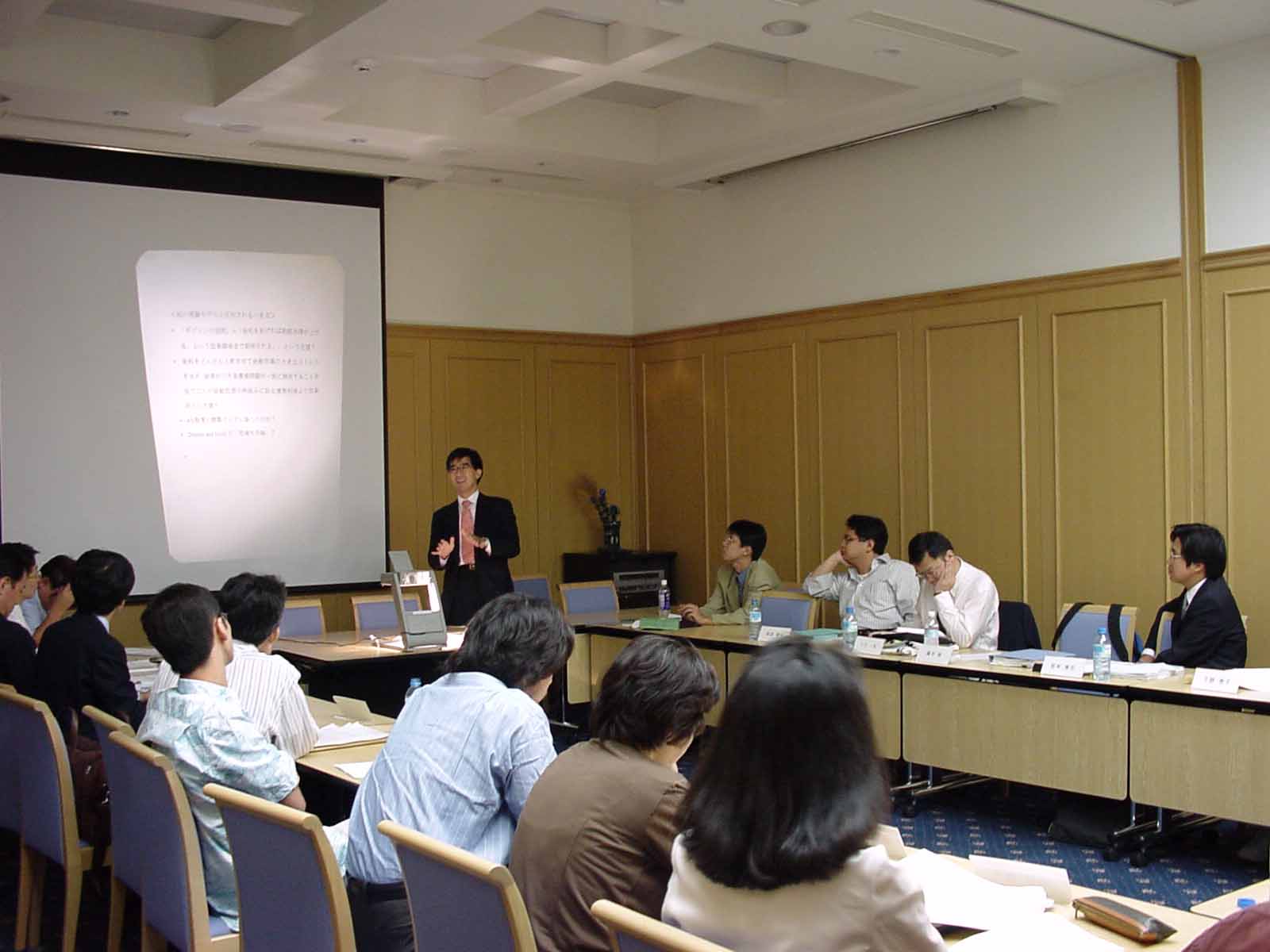
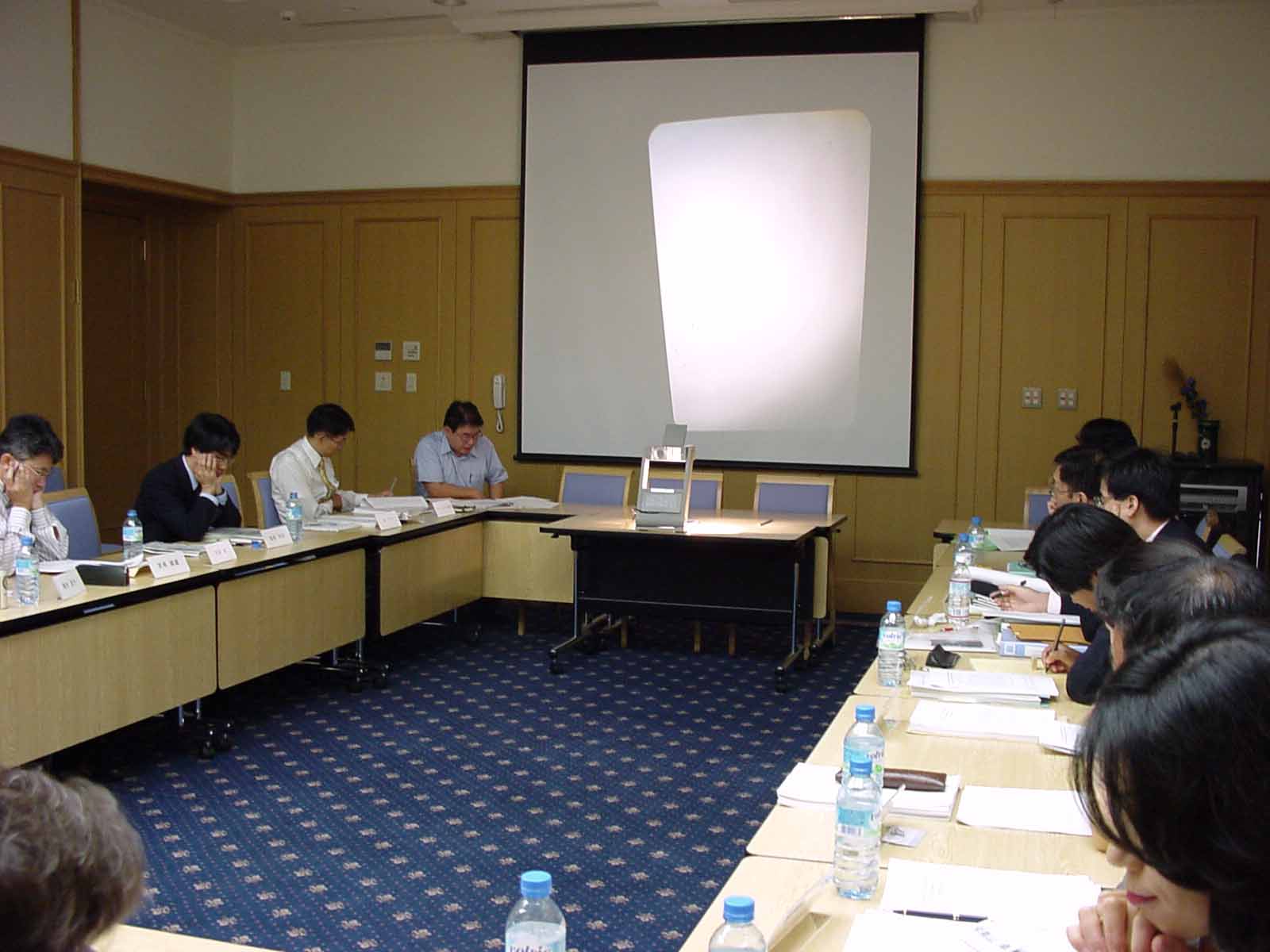
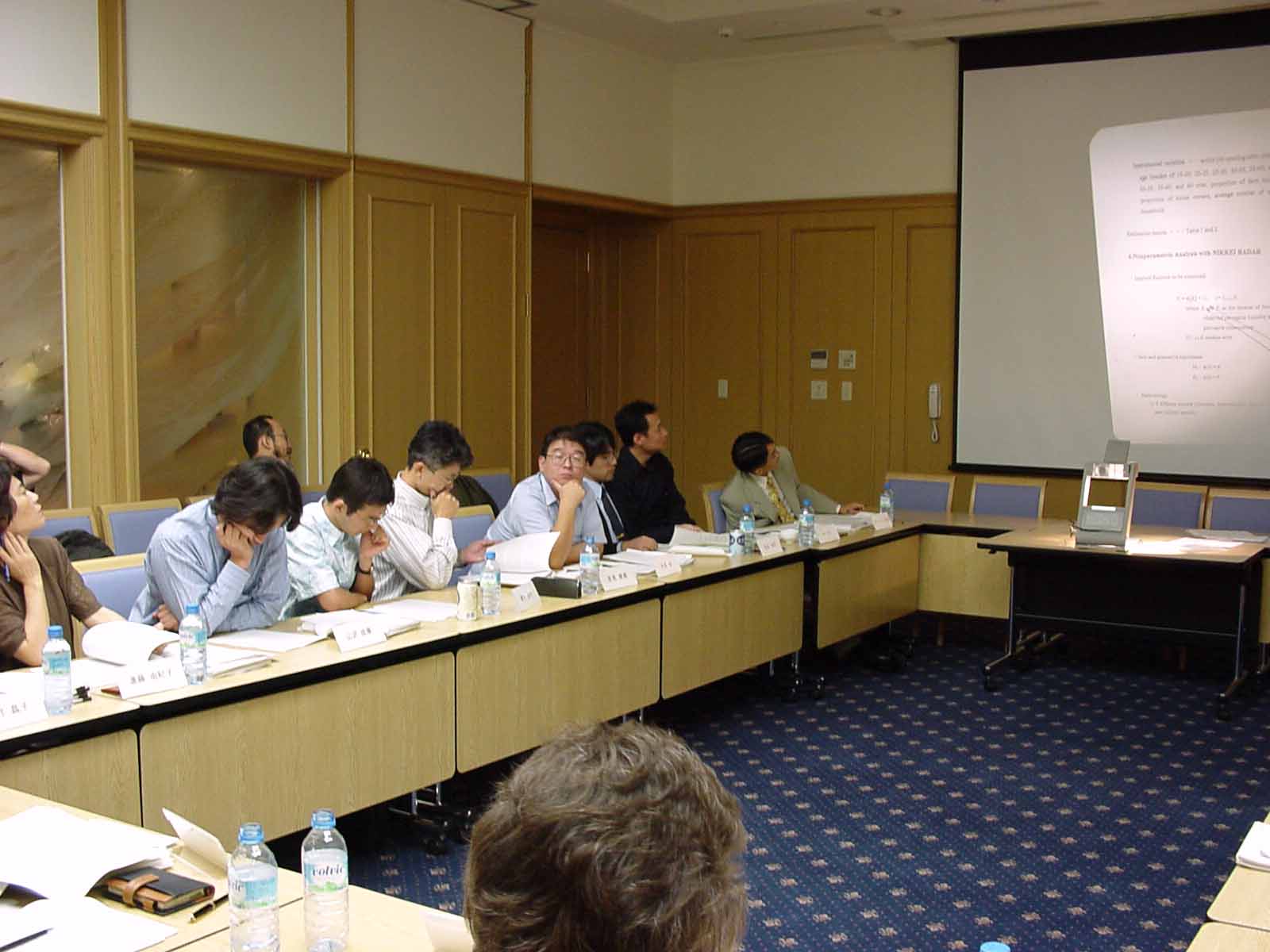
This is the second annual CIRJE-TCER (Tokyo Center for Economic Research) conference. As in the first macro conference, economists were invited from think tanks and government institutions as well as from academia. This year, two CIRJE short-term visitors, Professors Michael Knetter of Dartmouth College and Professor Edward Prescott of University of Minnesota, joined in the discussion.
PROGRAM
| Time | Presenter | Title | Discussant |
|---|---|---|---|
| 9:30 - 10:30 | Kiyotaka Nakashima (Osaka U.) Makoto Saito(Osaka U.) |
"Strong Money Demand and Nominal Rigidity: Evidence from the Japanese Money Market under the Low Interest Rate Policy" |
Hiroshi Fujiki (BOJ) |
| 10:45 - 11:45 | Yoshiyasu Ono (Osaka U.) Kazuo Ogawa (Osaka U.) Atsushi Yoshida (Osaka Pref. U.) |
"Liquidity Preference and Persistent Unemployment with Optimizing Agents: An Empirical Evidence" |
Etsuro Shioji (Yokohama Nat'l Univ) |
| 11:45 - 13:00 | Lunch | ||
| 13:00 - 14:00 | R. Anton Braun (Int'l University) Keiichi Kubota (Musashi U.) |
"The Effect of Government Capital on Labor Productivity in Japan's Prefectures" |
Kiyoshi Mitsui (Meijigakuin Univ) |
| 14:15 - 15:15 | Kiyohiko Nishimura (Tokyo U.) Masato Shirai (Tokyo U.) |
"Fixed Costs, Imperfect Competition and Bias in the Technology Measurement: Japan and the U.S." | Masahiro Kuroda (Keio Univ) |
| Double Feature on Asset Pricing | |||
| 15:30 - 17:30 | Tokuo Iwaisako(Tsukuba Univ) | "On Testing Consumption-Based CAPM Using Japanese data: It's Still a Puzzle" | Kenji Wada (Keio Univ) Tokuo Iwaisako (Tukuba Univ) |
| Naohiko Baba(BOJ) | "Exploring the Role of Money in Asset Pricing in Japan: Do Monetary Considerations Significantly Improve the Empirical Performance of C-CAPM?" |
||
| 18:00 | Group Dinner | ||
The Financial Evolution of Japan and the United States
(CIRJE Conference)
- Organizer: Tokutaro Shibata
- July 28, 2000
- Sanjo Conference Hall, University of Tokyo
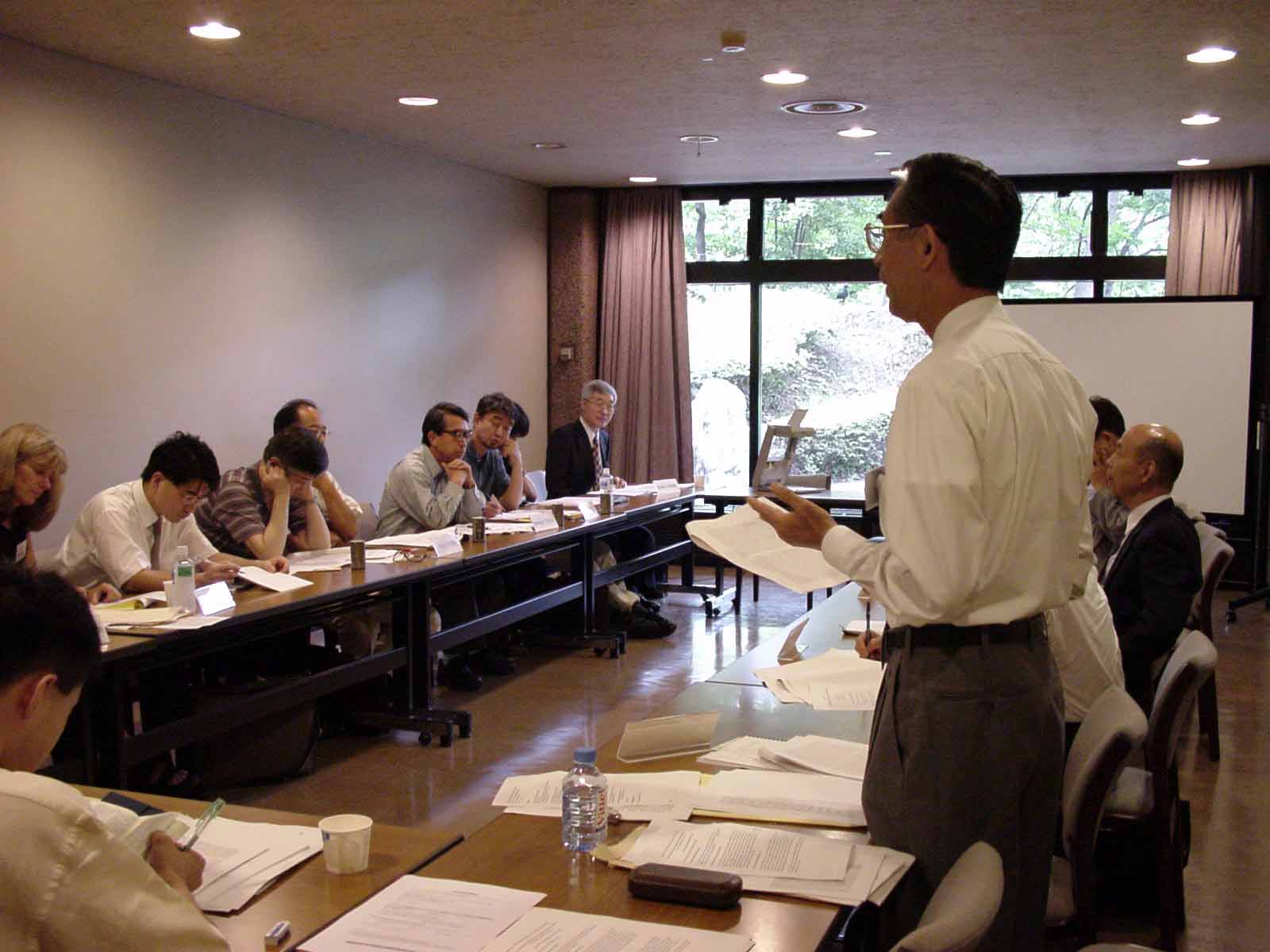
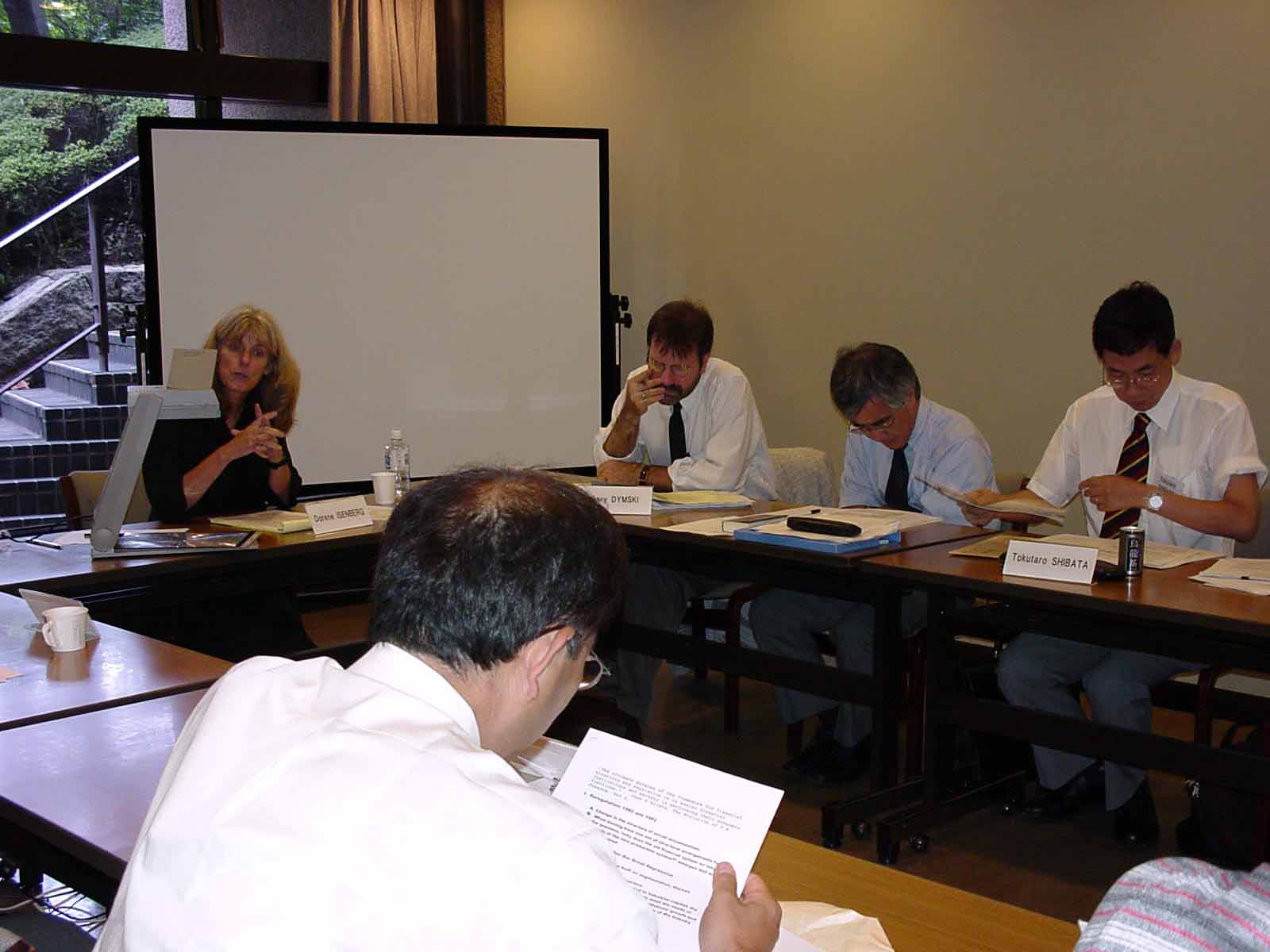
PROGRAM
Morning Session: Bubble Economy in Japan
(10:30-12:50)
Presiding: Katsumi Sugiura (Teikyo University)
"The Asset Price Bubble, Security Market and Bank Behavior"
Masanao Itoh (University of Tokyo)
"Japan's Continuing Financial Difficulties and Confused Economic Policies"
Makoto Itoh (Kokugakuin University)
Discussants: Masayoshi Tsurumi (Hosei University), Gary Dymski (University of California, Riverside)
Lunch: 13:00-14:00
Afternoon Session: Deregulation and Mergers in the United States
(14:30-16:50)
"Financial Consolidation and the Social Efficiency of the Banking System: Lessons from Recent U.S. Experience"
Gary Dymski (University of California, Riverside)
"The Political Economy of Institutional Change: An Investigation into the Origins of the US Financial Deregulations of 1980 and 1982"
Dorene Isenberg (Drew University)
Discussants: Motoo Haruta (Nihon University), Tokutaro Shibata (University of Tokyo)
Reception: 17:30-
CIRJE-TCER Conference on Mechanism Design for the Global Environment Protection
(TCER/CIRJE Conference)
- Organizer: Kazuharu Kiyono (CIRJE/Waseda University)
- July 22-23, 2000
- Kichijoji Dai-Ichi Hotel
This conference was held under the project "Global Environment and Energy Industries." The purpose of the conference was to investigate the role of international cooperation in protecting the global environment. The conference considered international measures for abating green-house gases and ways to promote cross-country transfers of environmental management technologies that would increase global efficiency in energy use. The title of the conference was "Mechanism Design for the Global Environment Protection".
Participants
M. Okuno-Fujiwara (U. of Tokyo), M. Kuroda (Keio U.), K. Otsuka (Tokyo Metropolitan U.), T. Sonobe (Tokyo Metropolitan U.), T. Iwami (U. of Tokyo), J. Ishikawa (Hitotsubashi U.), Y. Yaguchi (Tokyo Metropolitan U.), H. Konishi (Tokyo Metropolitan U.), N. Hirakata (Keio U.), Y. Shimpo (Keio U.), K. Futagami (Osaka U.), K. Tadenuma (Hitotsubashi U.), N. Matsueda (Kwansei Gakuin U.)
PROGRAM
| time | chair | presentation title | presenter | discussant |
|---|---|---|---|---|
| July 22, Saturday | ||||
| 9 :00-10 :00 | Tadenuma | Global Environment Protection and Economic Analysis | Okuno-Fujiwara, Kuroda | Otsuka |
| Part I : Economy and Environment/Role of International Cooperation | ||||
| 10 :15-11 :15 | Kuroda | Economy and Environment | Yaguchi, Sonobe | Shimpo |
| 11 :15-12 :15 | Kuroda | International Cooperation against Global Warming | Okuno-Fujiwara, Kiyono | Ishikawa |
| 13 :15-14 :15 | Kuroda | Abatement Costs and International Cooperation | Kuroda, Shimpo | Okuno-Fujiwara |
| Part II: Economic Analysis of Kyoto Mechanism | ||||
| 14 :15-15 :15 | Suzumura | Efficacy and Limits of International Emissions Trading | Konishi | Futagami |
| 15 :30-16 :30 | Suzumura | Global Environment and International Trade | Ishikawa, Kiyono | Okuno-Fujiwara |
| 16 :30-17 :30 | Suzumura | Economic Aids for Environment Protection | Matsueda, Futagami, Shibata | Konishi |
| July 23, Sunday | ||||
| Part III: Limits to the Kyoto Mechanism | ||||
| 9 :00-10 :00 | Futagami | Environment Protection and Economic Development | Otsuka | Iwami |
| 10 :15-11 :15 | Futagami | Environment Improvement and Technology Transfer | Shimpo, Hirakata | Kiyono |
| 11 :15-12 :15 | Futagami | International Obligations for Global Environment Protection | Suzumura, Tadenuma | Kuroda |
| 13 :15-14 :15 | Okuno-Fujiwara | Remaining Issues | Otsuka | Suzumura |
| 14 :15-15 :15 | Okuno-Fujiwara | Economic Analysis of Environment Regulations | Kiyono | Matsueda |
| 15 :30-17 :00 | Okuno-Fujiwara | Concluding Discussion | ||
Summary
This conference focused on the efficacy and limitations of the Kyoto Mechanism for reducing global warming. The conference started by sharing the importance of the need to confront and respond to global warming.
The remainder of the papers presented in Part I (Economy and Environment/Role of International Cooperation) discussed the relation of economic development and environmental quality as well as the impacts of environmental regulations currently in force, the need for international cooperation and its role in responding to global warming from a theoretical perspective, and the costs of abating green-house gases.
In Part II (Economic Analysis of Kyoto Mechanism), the central issues were the workings and efficacy of the Kyoto mechanism in enhancing global environmental quality: the deficiencies in international emissions trading for minimizing the global costs for emissions abatement due to imperfect monitoring of firms emitting the green-house gases; the differences in the effects of environment regulations, direct or indirect, on the trade structure and world economic performance; and the efficacy of better environment technology transfers to the developing countries in improving global environmental quality.
And in Part III (Limits to the Kyoto Mechanism), the limits of the Kyoto mechanism were explored from a wider point of view: the importance of designing property rights and making better use of market mechanisms for protecting the environment in developing countries; the need to capture more accurately the technology gap between advanced and developing countries in enforcing technology transfers; and the meaning of international obligations for global environment protection from the viewpoint of welfare economics.
An additional paper, which was unplanned when the second conference schedule was decided, summarized the basic principals of the economics of environmental protection and regulation. This paper provided both the participants and prospective readers with a common set of economic tools.
The conference closed with a presentation of the remaining issues, and a discussion of ways to improve and prepare each paper for subsequent publication in a single volume.


color.png)